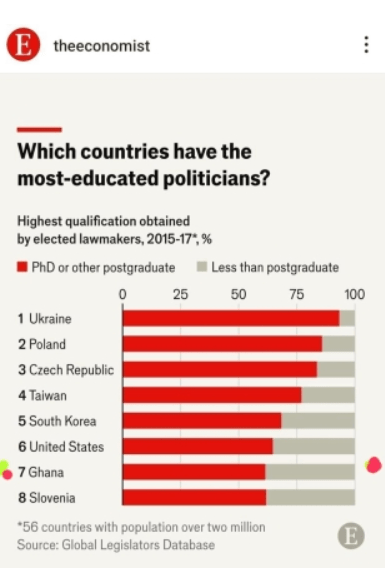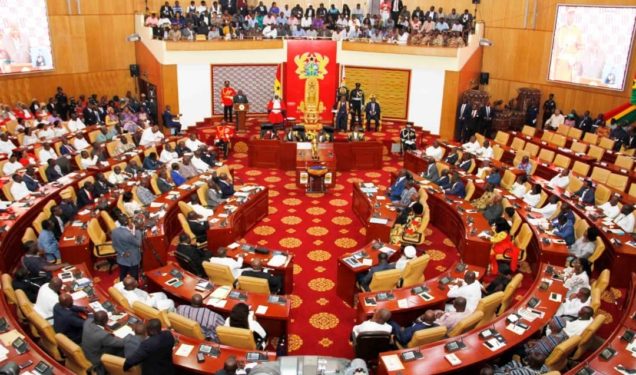Ghana has been ranked seventh in a recent analysis of countries with the most educated politicians, as reported by The Economist.
This assessment examines the educational qualifications of elected officials based on studies from global universities, utilizing data from 2015, 2017, and 2023, sourced from the Global Legislators Database.
The analysis includes 56 countries with populations exceeding two million.
The report focuses on the highest academic achievements of lawmakers, revealing a notable percentage who hold PhDs or other advanced degrees.
Ukraine tops the list, followed by Poland, the Czech Republic, Taiwan, South Korea, the United States, and Ghana, with Slovenia completing the top eight.

The report sheds light on the educational backgrounds within national parliaments, an area that political scientists have traditionally approached through metrics like the average age of representatives (currently 51) and the percentage of women (27%). However, analyzing educational qualifications has presented challenges across various nations.
In late 2023, two datasets were released that address this issue. The first study, conducted by researchers from six universities, gathered biographical information on nearly 20,000 parliamentarians from 97 countries between 2015 and 2017. This analysis found that 78% of parliamentarians held at least a bachelor’s degree, with 40% holding postgraduate degrees—significantly higher than the global averages of 35% for wealthier countries and 15% for poorer ones.
Ukraine stood out with the highest proportion of legislators possessing postgraduate degrees, with nearly a quarter holding doctorates. Since its independence in 1991, every Ukrainian president except Volodymyr Zelenskyy has claimed a doctoral degree. Other nations with well-educated legislators include South Korea, where about a third hold doctorates, and the United States, where more than two-thirds have postgraduate degrees.
In contrast, some countries, such as Italy, Norway, and the UK, have a significant number of parliamentarians with only secondary education. Notably, UK House of Commons Speaker Sir Lindsay Hoyle did not attend university, and prominent Italian politicians like Luigi Di Maio and Matteo Salvini did not complete higher education.
The second study, conducted in 2023 by Chilean researchers, examined 6,000 legislators from nearly 30 countries. It found that in North and Latin America, law graduates make up the largest blocs in national legislatures, while Nordic countries tend to have politicians with backgrounds in social sciences. The UK, in particular, has a higher representation of legislators with degrees in arts and humanities.
Despite the high educational qualifications of politicians, research does not consistently show that more educated leaders perform better. A 2015 study of U.S. Congress members indicated no significant correlation between educational attainment and legislative success. Similarly, a recent study in Spain found that mayors with degrees did not outperform those without in terms of job creation or budget management.
While countries with many lawyers in parliament do not necessarily exhibit stronger rule of law, the trend reveals that advanced-degree politicians face growing challenges in elections. As national legislatures become more educated, there are concerns about representation, as they may become less reflective of the general populace.
This shift risks alienating citizens who feel disconnected from elite political figures. Although parliaments are gradually becoming younger and more gender-balanced, they are also becoming increasingly elite, raising questions about their ability to represent the electorate’s diversity effectively.


